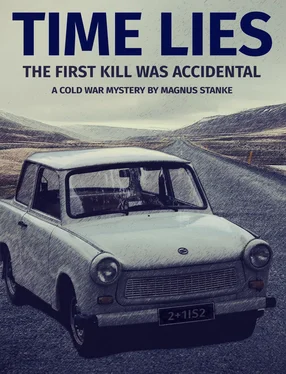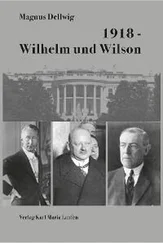In reply, Gerhardt made a breathy sound through his teeth. To his son it was the devastating sound of disdain. Perhaps he misunderstood, perhaps Dad wasn’t judging his young son’s ignorance at all, but merely releasing some trapped air from his mouth with ill-timed precision. But to Tobias it sounded and felt like being ridiculed once again and he realised fully how hurt he was when Willie and Albert returned a few minutes later. By then most of the crowd had dispersed and there was little trace left of any historical happenings.
‘Guess who we just saw!’ Gerhardt said.
‘Who, Dad?’ Albert said.
‘Mother Teresa?’ Willie hunched his shoulders.
‘Only Elvis Presley, the king of Rock’n’Roll. That’s who!’ Dad said.
‘The quiff, the teddy boy? Yeah, that’s not impossible, actually. He’s doing his military service not far from here, in Friedberg, but they let him sleep in a villa here in town. Some people are more equal than others, even in the US army,’ Willie said.
‘They chopped off the quiff but it was him all right. Just raced across the street, chased by a crowd of young girls. And them journalists. Saw ‘em with my own eyes,’ Dad said.
‘Who’s Alois?’ Albert said.
Dad looked at him tenderly and ruffled his hair.
‘Well, how could you know him, son? We’re a bit isolated on that Ith of ours, aren’t we? Next year we’ll get our own television set. You’ll get to see him, too,’ Gerhardt said.
‘I’ve got some 45s at home. Hot stuff. We’ll give them a spin when we get back, if your dad has no objections. I have a feeling you might like him,’ Uncle Willie said and smiled at Albert, who would start his record collection that year.
That evening, soon as they shut the doors to the car and started the drive back home, Tobias cried in the back seat. He hadn’t wanted Uncle Willie to see him this way, had fought against the tears all afternoon but couldn’t keep them in check any longer now that they were alone.
‘Tobi is crying, Dad,’ Albert said when he saw what was happening. There was sympathy and surprise in his voice.
Gerhardt shifted in his seat in order to find Tobias’ reflection in the rear-view mirror.
‘What’s wrong now, son?’ he said.
Tobias was resolute, and his pain was as deeply felt as he was inarticulate. He would not and could not say how the constant difference in treatment he and Albert received from Dad and everybody else hurt him. He couldn’t deal with the unconcealed mockery in his father’s snort on the one hand, and with the warm understanding Dad had extended towards Albert on the other. Most of the time he experienced the inequality of affection as dull and unfocused. That day it had become an acute, piercing ache. Although he wiped at his tears they kept coming back.
‘Am not crying,’ he said.
‘Bertie, let your little brother cry, why don’t you? Leave him alone. After all, he’s only the wee one,’ Gerhardt said and smirked sarcastically.
That had been the last time Dad saw Tobias cry, and remembering it still hurt like a motherfucker nearly twenty years on.
*
And now Elvis had been dead for exactly one year and Tobias felt sad again, sad like he had all those years ago on the drive back from Bad Nauheim, sad about life in general, about what had become of him. Worse was still to come.
He was so caught up in his sadness that he didn’t see Detlev Donnersberg at first. Detlev was leaning against his car and somebody else was inside, maybe a woman.
Detlev, alone with a female companion on a deserted forest path…It was getting interesting. If only Tobias could get a better look at the companion. But Detlev positioned himself deliberately between Tobi and her – which made it even more interesting.
After a brief and awkward greeting – Detlev was three or four years his senior and merely a church acquaintance after all – Tobi moved on.
As he reached a bend in the path that would remove the car from his field of vision he turned around once more to get a better look at the woman.
She was almost a girl, much younger than expected.
Where had he seen her before?
It didn’t come immediately. It took him the best part of the day to remember where he had seen the girl and to come up with a plan to see her again. Then he was well underway.
Karl has done it, — period.
In his mind this thought doesn’t require an adverbial qualifier like ‘already’ or ‘at last’. It took however long it took, and he has done it. He has proved that time actually passes. He knows this because he can hear his hair grow when he does nothing but listen. The sound is faint, but it’s audible, and while he listens moments collect, become longer moments, flow together in a time-and-space continuum. And then they pass.
It’s either that or he has gone bonkers.
Fact is, time can be managed and has therefore become irrelevant. It has lost all meaning. It doesn’t matter if he’s locked up for another year or another minute. Which isn’t to say that he trusts time. Karl has spent more of it being happy than sad, and yet it’s the sadness that gets to him if he allows it to, as though good times were subservient to misery. He learned to condense time through thought when he was in prison. He found a way to get lost in thinking, and to lose time while he was at it, in the infinitesimal spaces between thoughts. He has become rather good at this. He can get lost for hours, maybe days, in a state of near-total suspension where his heart rate and breathing slow down, his metabolism takes a break and his thoughts stop altogether.
He starts by concentrating on these gaps between thoughts and stretches them like rubber bands. From the outside it looks as though he just sits and breathes occasionally. His in-breath is big and he sends it down deep into his consciousness, into the perception of his body, all the way down into the tiny veins in his toes and throughout his viscera. He uses up virtually all the energy contained in the in-breath. When he exhales, there is hardly anything left; little air, even less oxygen and practically no energy at all.
Karl doesn’t know anything about meditation, about the state of nirvana or any related spiritual concepts. That’s not why he does what he does, to reach salvation of the soul. He does it because it comes naturally to him under the circumstances, because there is nothing else to do and because, well, it helps to pass the time. It kept him sane in prison, relatively speaking.
Once the conscious thought process is suspended, Karl’s mind is free to wander back in time. His inner eye watches scenes and people from his long forgotten childhood, almost tangibly in front of him. But he never reaches out his hand, never tries to touch what only he can see, and see only, never hold.
*
Sometimes even Karl can’t help caring a little about how long he has been here in this room. He’s worked out why the air in the room doesn’t become stale. Occasionally he detects weak currents of fresh air coming in through the tiny gap under the metal door. They’re not cold, exactly, but they are different from the air in the room.
Whenever he detects the life-giving flow, Karl concludes that the wig man, his jailor, is nearby. Perhaps he’s as little as a few inches away from him, spying on him benevolently, but watching for sure. This knowledge mustn’t alter the way Karl behaves, Karl decides. The man is watching and waiting for him to do something, and if Karl is aware of that, if he tries to second-guess what the man wants to see, he’s just as liable to get it wrong as not.
So he does nothing. Nothing different, that is. He just continues doing nothing, waiting, thinking, remembering, voiding his mind.
Читать дальше












